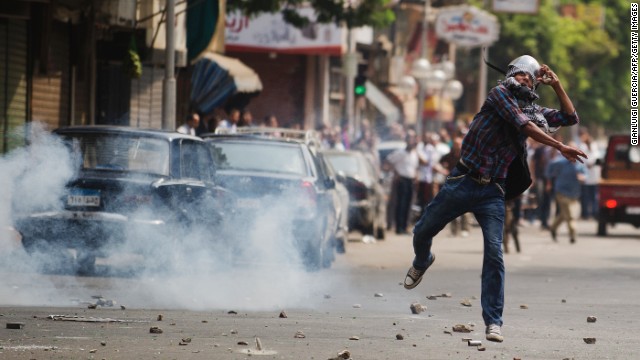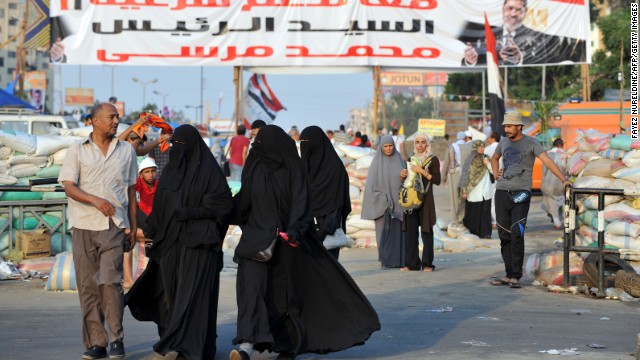 Egyptian security forces moved in on two massive makeshift camps that
supporters of deposed President Mohamed Morsy had set up, bulldozing
tents, lobbing tear gas, and escorting away protesters Wednesday
morning.
Egyptian security forces moved in on two massive makeshift camps that
supporters of deposed President Mohamed Morsy had set up, bulldozing
tents, lobbing tear gas, and escorting away protesters Wednesday
morning.
The Muslim Brotherhood said 200 Morsy supporters were killed and more than 8,000 injured.
The government claimed
casualties on its side as well. The interior ministry said two security
officials were killed and nine injured.
When reached, the health ministry disputed the Muslim Brotherhood claim. It said 26 civilians were hurt -- and none killed.
In the chaos of the raid, it was impossible for CNN to verify the claims and counter claims.
The government suspended
rail service to Cairo. The Brotherhood said it was to prevent more of
its members from streaming into the city.

The raids began shortly
after 6 a.m. (12 a.m. ET) at the two camps: one near the Rabaah
al-Adawiya mosque in eastern Cairo, and a smaller one at the Nahda camp,
near the Cairo University campus.
By 8:45 a.m., the
interior ministry said the smaller camp had been cleared of
demonstrators. All that remained were remnants of torn-down tents.
Hassan Al Qabana, who
works at the media center set up at the Rabaa camp, said the location
was facing a "full-on assault" and the wounded were streaming in.
Police in riot gear were
out in full force, escorting away men. The interior ministry put the
number at more than 200, and said they were caught with weapons and
ammunitions.
A fire burned in the distance, sending a large plume of black smoke into the sky.
Mothers and fathers whisked away children, gas masks on their faces.
A group of protesters tried unsuccessfully to overturn a police van.
Protests leaders stood
on a stage, microphone in hand. Throngs of supporters raised their hands
in a peace sign, or waved Egypt's flag.
The Muslim Brotherhood police were throwing Molotov cocktails at the clinics inside the camps.
The interior ministry
said security forces did not use gunfire and instead were attacked by
"terrorist elements" inside the camps.
"Egyptian security forces are committed to the utmost self-restraint in dealing with the protesters," the ministry said.
For six chaotic weeks,
Morsy supporters had massed at the two camps -- refusing to budge until
Morsy was reinstated, and morphing the locations into cities within a
city.
They lived and slept in tents.
Vendors sold everything from bottled water to masks. Children played in inflatable castles and splashed in kiddie pools.
The government have accused the protesters of packing the sites with their children to use them as human shields.
The raid Wednesday was not unexpected.
Since the Muslim holy
month of Ramadan ended last week, the protesters had hunkered down and
waited for the crackdown that the government had long hinted at.
They fortified their sites with sandbags, tires and stacks of bricks.
A deadly toll
The protests started soon after Egypt's military toppled Morsy in a coup last month.
Hundreds have been
killed and thousands have been injured in recent weeks, either in
clashes between opposing protesters or in clashes between protesters and
Egyptian security forces.
Last month, Information
Minister Durriya Sharaf el-Din said the gatherings were a threat to
national security and traffic congestion.
And two weeks ago, Mansour issued orders in the event of a possible "state of emergency," the EGYnews website reported.
"State of emergency" is a
loaded term in Egypt. Former President Hosni Mubarak ruled for 30 years
under an emergency decree that barred unauthorized assembly, restricted
freedom of speech and allowed police to jail people indefinitely.
Morsy's fall
Morsy became Egypt's
first democratically elected president in 2012, a year after popular
protests forced Mubarak to resign and end his three-decade rule.
But a year into Morsy's
term, many Egyptians wanted him out, too. They said the Western-educated
Islamist, aligned with the Muslim Brotherhood movement, was not
inclusive and they said he had failed to deliver on the people's
aspirations for freedom and social justice.
Morsy was accused of
authoritarianism and trying to force the Brotherhood's Islamic agenda
onto the nation's laws. He was also criticized by many Egyptians
frustrated with rampant crime and a struggling economy that hadn't shown
improvement since Mubarak resigned.
But supporters say Morsy repeatedly offered Cabinet positions to secularists and liberals -- only to get repeatedly rejected.
Since taking power from Morsy, Egypt's military has installed an interim civilian government with Mansour as interim president.
But Egypt's generals,
the ones who oversaw Morsy's ouster and led the country for a year after
Mubarak's resignation, still wield significant power.
The list of accusations
against Morsy include: collaborating with the militant group Hamas to
carry out hostile acts, attacking law enforcement buildings, officers
and soldiers, storming prisons, vandalizing buildings and deliberately
burning a prison.
He hasn't been seen since his ouster.
culled from www.cnn.com
No comments:
Post a Comment